牛津高中英语 模块六 unit3 Grammar 虚拟语气
- 格式:ppt
- 大小:368.00 KB
- 文档页数:8
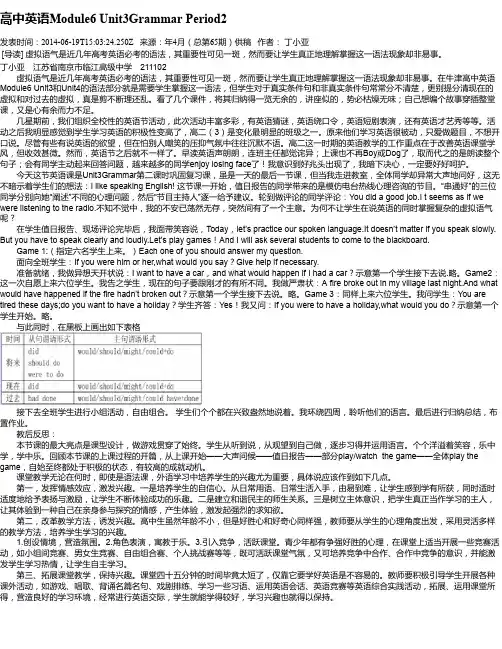
高中英语Module6 Unit3Grammar Period2发表时间:2014-06-19T15:03:24.250Z 来源:年4月(总第65期)供稿作者:丁小亚[导读] 虚拟语气是近几年高考英语必考的语法,其重要性可见一斑,然而要让学生真正地理解掌握这一语法现象却非易事。
丁小亚江苏省南京市临江高级中学211102虚拟语气是近几年高考英语必考的语法,其重要性可见一斑,然而要让学生真正地理解掌握这一语法现象却非易事。
在牛津高中英语Module6 Unit3和Unit4的语法部分就是需要学生掌握这一语法,但学生对于真实条件句和非真实条件句常常分不清楚,更别提分清现在的虚拟和对过去的虚拟,真是剪不断理还乱。
看了几个课件,将其归纳得一览无余的,讲座似的,势必枯燥无味;自己想编个故事穿插整堂课,又是心有余而力不足。
几星期前,我们组织全校性的英语节活动,此次活动丰富多彩,有英语猜谜,英语绕口令,英语短剧表演,还有英语才艺秀等等。
活动之后我明显感觉到学生学习英语的积极性变高了,高二(3)是变化最明显的班级之一。
原来他们学习英语很被动,只爱做题目,不想开口说。
尽管有些有说英语的欲望,但在怕别人嘲笑的压抑气氛中往往沉默不语。
高二这一时期的英语教学的工作重点在于改善英语课堂学风,但收效甚微。
然而,英语节之后就不一样了。
早读英语声朗朗,连班主任都觉诧异;上课也不再Boy或Dog了,取而代之的是朗读整个句子;会有同学主动起来回答问题,越来越多的同学enjoy losing face了!我意识到好兆头出现了,我暗下决心,一定要好好呵护。
今天这节英语课是Unit3Grammar第二课时巩固复习课,虽是一天的最后一节课,但当我走进教室,全体同学却异常大声地问好,这无不暗示着学生们的想法:I like speaking English! 这节课一开始,值日报告的同学带来的是模仿电台热线心理咨询的节目。
“串通好”的三位同学分别向她“阐述”不同的心理问题,然后“节目主持人”逐一给予建议。
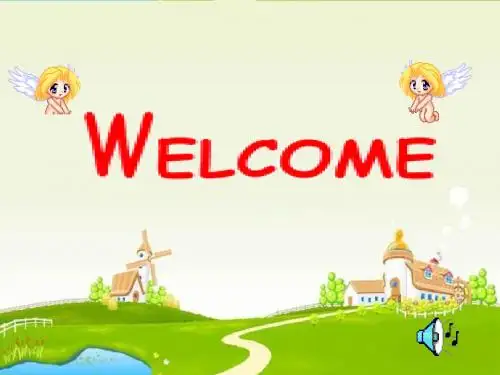
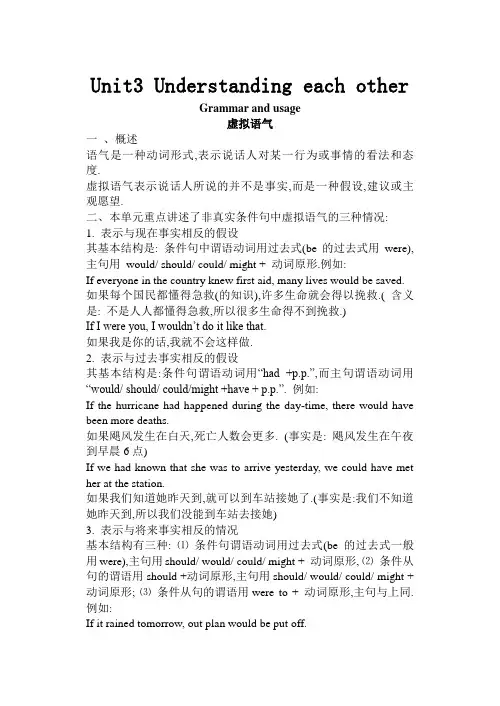
Unit3 Understanding each otherGrammar and usage虚拟语气一、概述语气是一种动词形式,表示说话人对某一行为或事情的看法和态度.虚拟语气表示说话人所说的并不是事实,而是一种假设,建议或主观愿望.二、本单元重点讲述了非真实条件句中虚拟语气的三种情况:1. 表示与现在事实相反的假设其基本结构是: 条件句中谓语动词用过去式(be的过去式用were), 主句用would/ should/ could/ might + 动词原形.例如:If everyone in the country knew first aid, many lives would be saved. 如果每个国民都懂得急救(的知识),许多生命就会得以挽救.( 含义是: 不是人人都懂得急救,所以很多生命得不到挽救.)If I were you, I wouldn’t do it like that.如果我是你的话,我就不会这样做.2. 表示与过去事实相反的假设其基本结构是:条件句谓语动词用“had +p.p.”,而主句谓语动词用“would/ should/ could/might +have + p.p.”. 例如:If the hurricane had happened during the day-time, there would have been more deaths.如果飓风发生在白天,死亡人数会更多. (事实是: 飓风发生在午夜到早晨6点)If we had known that she was to arrive yesterday, we could have met her at the station.如果我们知道她昨天到,就可以到车站接她了.(事实是:我们不知道她昨天到,所以我们没能到车站去接她)3. 表示与将来事实相反的情况基本结构有三种: ⑴条件句谓语动词用过去式(be 的过去式一般用were),主句用should/ would/ could/ might + 动词原形, ⑵条件从句的谓语用should +动词原形,主句用should/ would/ could/ might + 动词原形; ⑶条件从句的谓语用were to + 动词原形,主句与上同. 例如:If it rained tomorrow, out plan would be put off.假如明天下雨,我们的计划就得推迟. (最近天气很好.) (条件从句中的谓语动词用过去式,表示说话人认为下雨的可能性不大, 而如果用一般现在时的话,则表示说话人认为下雨的可能性很大)If he should see me, he would tell me.假如他看见我,就会告诉我. ( 用should + 动词原形强调一种有偶然实现的可能性,其现实性比用were to + 动词原形大, 比过去式+ 动词原形小)If he were to come, what should we say to him?假如他来了, 我们对他说什么呢? (用were to +动词原形比较正式,多用于书面语中, 表示实现的可能性很小)拟条件句和混合虚拟条件句.1. 单一虚拟条件句单一虚拟条件句指主句和从句与同一时间的事实相反的虚拟条件句. 例如:If it should rain tomorrow, the race would be put off.(主从句与将来事实相反) 如果明天下雨,比赛将推迟.If you had been more careful, you would have passed.( 主从句与过去事实相反) 如果你再仔细些,你就会通过的.If it were not for the leaning tower, the city of Pisa wouldn’t be so famous.如果没有斜塔的话,比萨城也不会这么有名.( 主从句与现在事实相反)2. 混合虚拟条件句很多情况下,从句和主句并不与同一时间的事实相反.例如:If you had followed my advice, your English would be much better.如果当时你听了我的话,现在你的英语就会好多了.( 从句与过去事实相反,主句与现在事实相反)If he weren’t a kind-hearted man, he wouldn’t have helped such a man as you that day.如果不是他这人很好心的话, 那天他决不会帮助一个像你这样的人的.( 从句是与现在情况相反的假设,主句表示与过去事实相反的假设.)If it had n’t been for you, I would have to make another trip there tomorrow.如果不是你的话, 我明天还要再走一趟.( 从句与过去事实相反,主句与将来事实相反.)注意: 在正式文体中,虚拟条件句的从句部分如果含有were, should 或had, 可将if省略,再把were, should 或had 移到从句句首,实行倒装.例如:Were it to rain tomorrow, we would delay our trip.如果明天下雨,我们将推迟旅行.Had you attended the party, you would have met Jack.如果你参加了聚会,你会见到Jack 的.Should I get a rise, I would treat you to whisky.如果我能涨工资,就请你喝威士忌.TaskWriting a letter to explain cultural misunderstandings●Teaching objectives:1.learn about taboos in different cultures and understand what theycan do or cannot do when they are in contact with people from different backgrounds2.learn to complete a text by listening3.review the ways to ask questions4.write a letter of an apology to explain misunderstandings●Teaching focus and difficulties:1.writing down answers2.writing a letter to explain misunderstandingsTeaching methods:1. Listening, reading and thinking to get students to understand the text.2. Pair discussion and group discussion to get students to participate in the classroom activities.●Teaching aids:The multimedia●Teaching procedures:●Step 1 Skills building 1: completing a textTips on completing a text by listening:1. Make sure you read the text first so you understand the subject of the text and the type of words that you are likely to hear.2. Try to guess the words that might be used to fill in the blanks.3. Look for clues in the sentences and in the words before or after the blanks.4. Decide if it is content words or grammar words that you are listening for.Step 2 ListeningYour school has some visitors from abroad. Your headmaster asked you and your classmate to show the guests around. Something puzzled you during the trip. Listen to the conversation between you and your classmate, and complete your diary entry on page 42.Step 3 ReadingA few days after you and your classmate had taken the visitors around Beijing your classmate found this article in a magazine. Circle the taboos that help explain some of the strange incidents that happened when you showed the visitors around.Suggested answers➢If you are from India, you may not eat beef because of your religion.➢If you are from the West, you probably would not like to eat chickens’ feet.➢In India, it is impolite to shake hands or give someone something with your left hand.➢Remember not to just put the business cards in your pocket without looking in Japan .Step 4 ListeningYou want more information about cultural habits, so you go to one of your teachers, who has traveled to the USA and Japan, for help. Listento your teacher and fill in the blanks in your notes below.Step 5 Skills building 2: asking questionsWhen we want to find out about something, we need to ask questions. We can use questions beginning with the following words:What – when we want to find out about something specific.How – when we want to find out the way something should be done. Which – when we want to specify which one of a choice of possibilities.When - when we want to inquire about time.Why - when we want to find out a reason.Where - when we want to find out about the place in which something happened.Step 6 PracticeYou want to ask your classmate about the following things. Form your questions with the correct question words first, and then find a partner to answer questions. Answers can be found in the magazine article on page 43. Take turns asking questions.Suggested answers1. What food do the people from India not eat?2. Which hand shouldn’t be used to shake hands with or give things to people from India?3. What do Japanese people have to buy when they travel anywhere?4. What should you do when a Japanese person gives you a business card?5. What does the OK sign mean for Japanese people?6. Why do people from the USA do not like crowded places?Step7 Skills building 3: writing a letter of apologyWhen writing a letter of apology, you need to include the following:⏹your address⏹the date⏹an opening⏹the purpose of the letter should be given in the first sentence.⏹an explanation⏹ a closing phrase (to apologize again)⏹your name and signatureStep8 PracticeYou want to write a letter of apology to the foreign visitors to explain misunderstandings. Find a partner and discuss what to include in the letter. Each person should write a different part.。

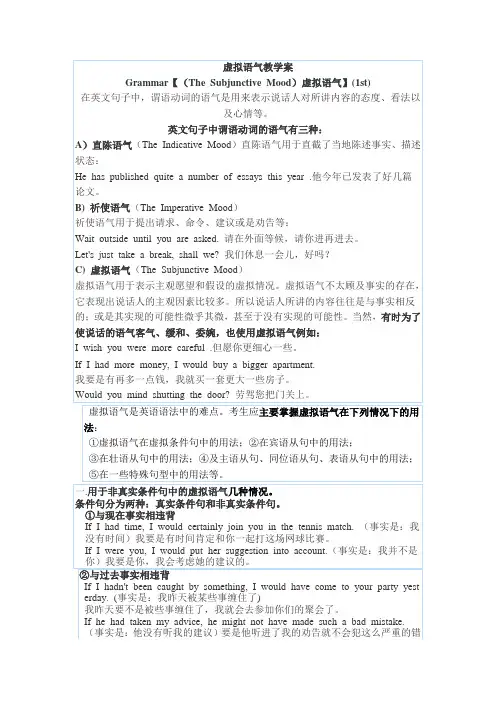

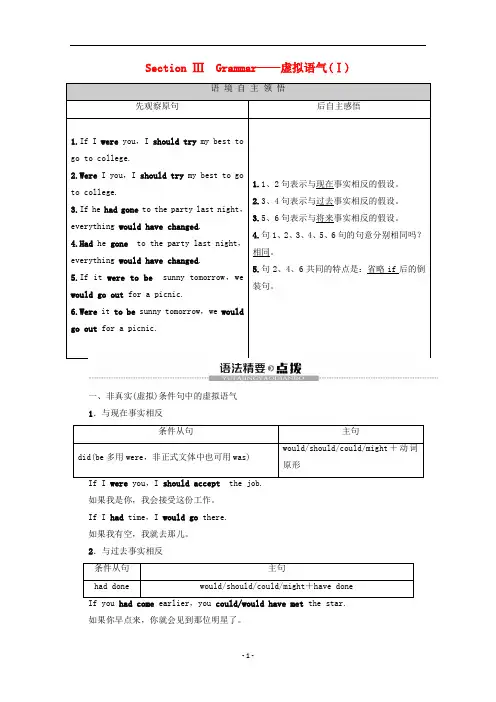
Section ⅢGrammar——虚拟语气(Ⅰ)语境自主领悟先观察原句后自主感悟1.If I were you,I should try my best togo to college.2.Were I you,I should try my best to goto college.3.If he had gone to the party last night,everything would have changed.4.Had he gone to the party last night,everything would have changed.5.If it were to be sunny tomorrow,wewould go out for a picnic.6.Were it to be sunny tomorrow,we wouldgo out for a picnic.1.1、2句表示与现在事实相反的假设。
2.3、4句表示与过去事实相反的假设。
3.5、6句表示与将来事实相反的假设。
4.句1、2、3、4、5、6句的句意分别相同吗?相同。
5.句2、4、6共同的特点是:省略if后的倒装句。
一、非真实(虚拟)条件句中的虚拟语气1.与现在事实相反条件从句主句did(be多用were,非正式文体中也可用was)would/should/could/might+动词原形如果我是你,我会接受这份工作。
If I had time,I would go there.如果我有空,我就去那儿。
2.与过去事实相反条件从句主句had done would/should/could/might+have done如果你早点来,你就会见到那位明星了。
If he had seen you yesterday,he would have returned you your book.如果他昨天见到你,他就会还给你书的。
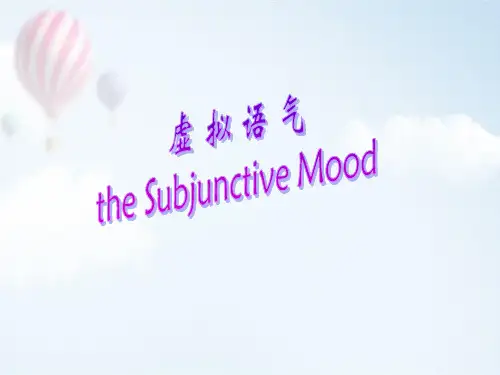
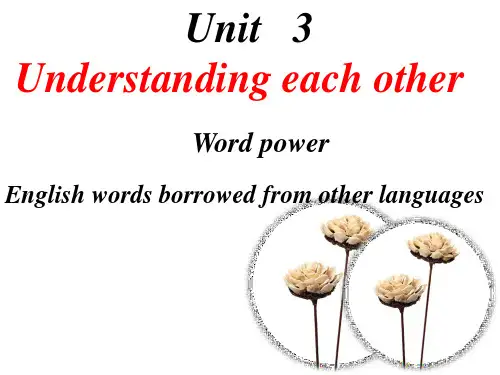
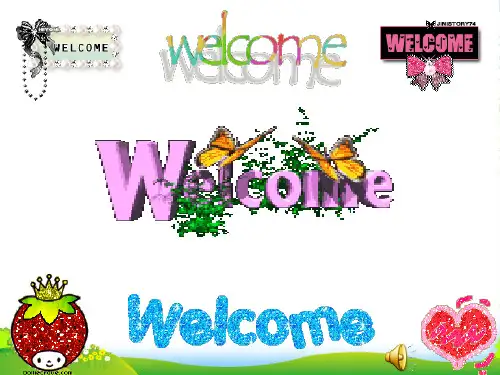
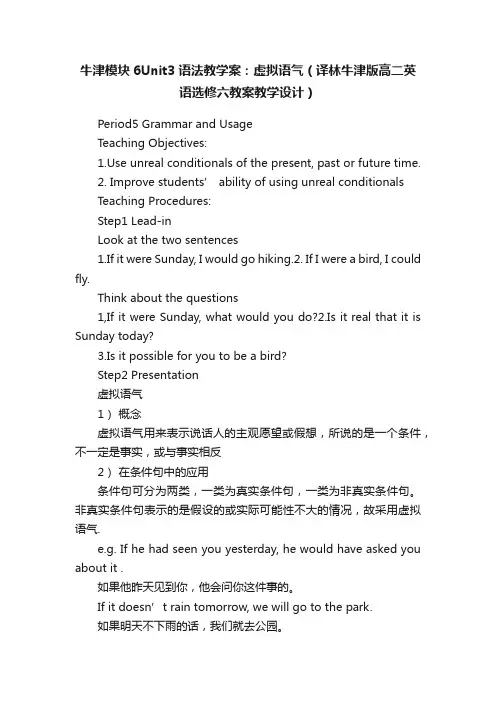
牛津模块6Unit3语法教学案:虚拟语气(译林牛津版高二英语选修六教案教学设计)Period5 Grammar and UsageTeaching Objectives:e unreal conditionals of the present, past or future time.2. Improve students’ ability of using unreal conditionalsTeaching Procedures:Step1 Lead-inLook at the two sentences1.If it were Sunday, I would go hiking.2. If I were a bird, I could fly.Think about the questions1,If it were Sunday, what would you do?2.Is it real that it is Sunday today?3.Is it possible for you to be a bird?Step2 Presentation虚拟语气1)概念虚拟语气用来表示说话人的主观愿望或假想,所说的是一个条件,不一定是事实,或与事实相反2)在条件句中的应用条件句可分为两类,一类为真实条件句,一类为非真实条件句。
非真实条件句表示的是假设的或实际可能性不大的情况,故采用虚拟语气.e.g. If he had seen you yesterday, he would have asked you about it .如果他昨天见到你,他会问你这件事的。
If it doesn’t rain tomorrow, we will go to the park.如果明天不下雨的话,我们就去公园。
一:虚拟语气在条件状语从句中的用法。
条件从句从句主句与现在事实相反动词的过去式(be的过去式一般用were)would/ should/ could/ might + 动词原形与过去事实相反 had + 过去分词 would/ should/ could/ might + have + 过去分词与将来事实相反 1.动词过去式2.should + 动词原形3.were to + 动词原形 would/ should/ could/ might + 动词原形1、表示与现在事实相反的假设和结果e.g.我是你的话,我会马上走。
Section Ⅲ Grammar —虚拟语气和状语从句语法图解探究发现①They have recommended that the site be closed and repaired.②They have suggested that the general public be encouraged to help with the problem.③A professor at the Academy has proposed that a fund be established to raise money.④Mary speaks as if she were Chinese.⑤It's high time that we should have/had a rest.⑥As long as you've got a raincoat, you'll be OK.⑦Just stay where you are and don't move.⑧Hero as he is, he has some shortcomings.⑨Whatever happens, you're going to have a marvelous time.⑩The little child eats whatever we give him.[我的发现](1)以上句中,①~⑤句谓语动词均使用了虚拟语气。
①、②、③从句中用should+动词原形,should可以省略。
(2)⑥~⑧句中黑体部分分别引导条件、地点、让步状语从句。
(3)由⑧句可知,as引导让步状语从句时,句子要采用倒装语序。
(4)⑨句中黑体部分引导让步状语从句,⑩句中引导名词性从句。
一、虚拟语气虚拟语气用于宾语从句、主语从句、表语从句或同位语从句中,常可表示要求、建议、命令、提议、意愿等,其虚拟语气往往是由“(should+)动词原形”构成。
牛津译林模块六第三单元虚拟语气虚拟语气(一)概念:谓语v用不同的形式表示说话人的不同意图,这种形式称为语气。
语气分三种:1.陈述语气:用来陈述一个事实,或提出一种看法,有肯定、否定、疑问、感叹等形式。
He is late for class. What fun!He is not interested in classical music.2.祈使语气:用来表示请求、邀请、命令、警告或劝告等(动词常用原形)Don’t be late!3.虚拟语气:表示说话人所说的不是事实,而是一种假设、愿望、怀疑或推测。
一、虚拟语气在if非真实条件句中Practice:1.如果我是你,我会接受他的建议。
2.如果明天下雨,我会待在家里。
3.如果你以前好好学习,你会通过考试的。
4.You didn’t let me drive. If we ______ in turn, you ______ so tired.A.drove; didn’t getB. drove; wouldn’t getC.were driving; wouldn’t getD. had driven; wouldn’t have got5.________ it rain tomorrow, we would have to put off the visitto the Yang Pu Bridge.A.WereB. ShouldB.Would D. Will注意:1.错综时间虚拟语气当从句主句所表示的行为所发生的时间不一致时,动词的形式要根据它所表示的时间作出相应的调整。
填空:1.If you ____________(follow)my advice just now, you _________(be)better now.2.If you __________(study)hard before, you _______(be)a college student now.单选:3.If you ______ with George earlier, you _____ so angry now.A.talked; would not beB. had talked; would not beC.would talk; would not beD. had talked; would not have been4.If we had taken such effective measures much earlier, the river _____ so seriously now.A.is not pollutedB.would not be polluted.C.had not been pollutedD. D. would not have been polluted2. if从句中,were,had(完成时态标志),should可以放在句首,(用于倒装结构),if必须省略。